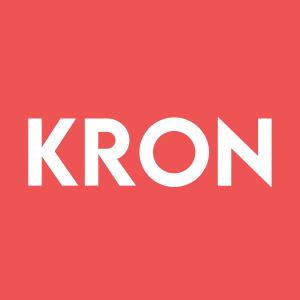Kronos Bio Announces First Patient Dosed with KB-0742 in an Expansion Cohort Focused on Platinum-Resistant High-Grade Serous Ovarian Cancer
Rhea-AI Summary
Kronos Bio (NASDAQ: KRON) has dosed the first patient in an expansion cohort of its KB-0742 clinical trial, focusing on platinum-resistant high-grade serous ovarian cancer (HGSOC). The trial uses an 80mg dose on a four-days-on, three-days-off schedule, which cleared the dose escalation phase. This dosing regimen is expected to provide a 1.8-fold increase in AUC compared to the previous 60mg three-days-on, four-days-off schedule.
KB-0742 has shown a favorable safety profile in over 100 patients, with no grade 3 or 4 neutropenia observed. The company plans to provide an efficacy update on this expansion cohort in the first half of 2025. HGSOC is particularly sensitive to CDK9 inhibition due to MYC amplification or overexpression and homologous recombination deficiencies, affecting a significant portion of ovarian cancer patients.
Positive
- KB-0742 cleared 80mg four-days-on, three-days-off dosing schedule in dose escalation
- Safety database of over 100 patients with no grade 3 or 4 neutropenia observed
- Preliminary anti-tumor activity shown in transcriptionally addicted solid tumors at 60mg dose
- New dosing regimen expected to provide 1.8-fold increase in AUC over seven days
- Prolonged stable disease of over 300 days observed in one platinum-resistant HGSOC patient
Negative
- None.
News Market Reaction
On the day this news was published, KRON declined 3.65%, reflecting a moderate negative market reaction.
Data tracked by StockTitan Argus on the day of publication.
— KB-0742 cleared 80mg four-days-on, three-days-off dosing schedule in dose escalation —
— Company expects to provide an efficacy update on this expansion cohort in 1H 2025 —
SAN MATEO, Calif. and CAMBRIDGE, Mass., July 23, 2024 (GLOBE NEWSWIRE) -- Kronos Bio, Inc. (Nasdaq: KRON), a company dedicated to developing small molecule therapeutics that address cancers and other diseases driven by deregulated transcription, today announced the first patient dosed in an expansion cohort with KB-0742 at a dose of 80mg given on a four-days-on, three-days-off schedule. This expansion cohort is enrolling platinum-resistant patients with high-grade serous ovarian cancer (HGSOC), a tumor type which is particularly sensitive to CDK9 inhibition due to MYC amplification or overexpression and deficiencies in homologous recombination (HRD+).
“To date, KB-0742 has a safety database of over 100 patients, with no grade 3 or 4 neutropenia observed, and has shown preliminary anti-tumor activity in transcriptionally addicted solid tumors at the 60mg dose given three-days-on, four-days-off,” said Norbert Bischofberger, Ph.D., president and chief executive officer, Kronos Bio, Inc., “Pharmacokinetic modeling of 80mg four-days-on, three-days-off schedule shows a 1.8-fold increase in AUC over seven days relative to the 60mg three-days-on, four-days-off schedule. With this dose and schedule, we believe that KB-0742 will deliver therapeutic responses in this high unmet need population. We look forward to providing an update on the efficacy of KB-0742 in the first half of 2025.”
In the United States there are an estimated 22,000 new cases of ovarian cancer each year, with a five-year survival rate of less than
“We are excited for the focused expansion of KB-0742 in platinum-resistant HGSOC. KB-0742 has to date provided prolonged stable disease of over 300 days in one of my platinum-resistant HGSOC patients,” said Howard “Skip” A. Burris M.D., president of Sarah Cannon Research Institute (SCRI). “HGSOC patients have limited treatment options after progressing on platinum therapy and KB-0742 brings new possibilities to those battling this devastating disease.”
Kronos Bio, Inc (Nasdaq: KRON) is a clinical-stage company dedicated to developing small molecule therapeutics that address deregulated transcription, a hallmark of cancer and other diseases. Our proprietary discovery engine decodes complex transcription factor regulatory networks to identify druggable cofactors. We screen for and optimize small molecules that target these cofactors in a tumor-specific context. These efforts have yielded a preclinical pipeline along with two internally developed drug candidates. KB-0742 targets CDK9 to address MYC deregulation in solid tumors and KB-9558 targets p300 to address IRF4 dependence in multiple myeloma.
Kronos Bio is based in San Mateo, Calif., and has a research facility in Cambridge, Mass. For more information, visit https://www.kronosbio.com/ or follow the Company on LinkedIn.
About KB-0742:
KB-0742 is a selective, oral inhibitor of CDK9, a key cofactor of oncogenic MYC transcription factor activity. KB-0742-1001 (NCT04718675) is a Phase 1/2 open-label dose escalation and cohort expansion study of KB-0742 as a treatment for MYC-amplified and other transcriptionally addicted relapsed or refractory solid tumors. KB-0742 is currently being studied in an expansion cohort focused on platinum-resistant high-grade serous ovarian cancer patients.
Forward-Looking Statements
Statements in this press release that are not statements of historical fact are forward-looking statements for purposes of the safe harbor provisions of the Private Securities Litigation Reform Act of 1995. The press release, in some cases, uses terms such as “anticipate,” “believe,” “could,” “expect,” “plan,” “will,” or other words that convey uncertainty of future events or outcomes to identify these forward-looking statements. Forward-looking statements include statements regarding Kronos Bio’s intentions, beliefs, projections, outlook, analyses or current expectations concerning, among other things, the next expected efficacy update on the expansion cohort in the KB-0742 trial; projections from pharmacokinetic modeling; our belief that KB-0742 will deliver therapeutic responses; estimated patient populations; the potential of Kronos Bio’s product candidates and its proprietary discovery engine; and other statements that are not historical fact. Actual results and the timing of events could differ materially from those anticipated in such forward-looking statements as a result of various risks and uncertainties, including, without limitation: changes in the macroeconomic environment or competitive landscape that impact Kronos Bio’s business; whether Kronos Bio will be able to progress its clinical trials on the timelines anticipated, including due to risks inherent in the clinical development of novel therapeutics; risks related to Kronos Bio’s limited experience as a company in conducting clinical trials; the risk that results of preclinical studies, early clinical trials (including preliminary results) and pharmacokinetic modeling are not necessarily predictive of future results; risks associated with enrolling clinical trials; and risks associated with the sufficiency of Kronos Bio’s cash resources and need for additional capital. These and other risks are described in greater detail in Kronos Bio’s filings with the Securities and Exchange Commission (SEC), including under the heading “Risk Factors” in its Quarterly Report on Form 10-Q for the quarter ended March 31, 2024, filed with the SEC on May 9, 2024. Any forward-looking statements that are made in this press release speak only as of the date of this press release and are based on management’s assumptions and estimates as of such date. Except as required by law, Kronos Bio assumes no obligation to update the forward-looking statements whether as a result of new information, future events or otherwise, after the date of this press release.
Source: Kronos Bio, Inc.
Investor & Media Contact:
Margaux Bennett
Vice President, Corporate Development and Investor Relations, Kronos Bio, Inc.
650-781-5026
mbennett@kronosbio.com








